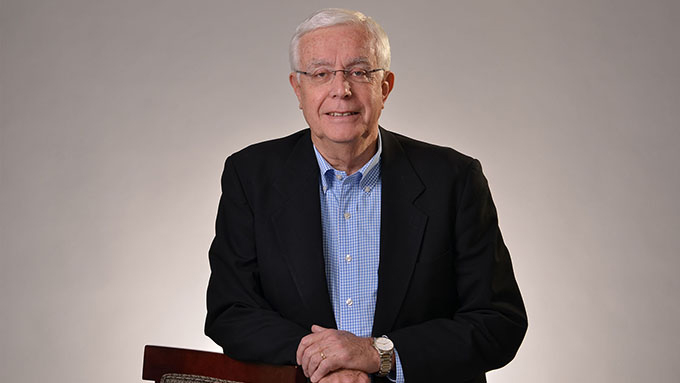
David Beukelman remembered for his impact on colleagues and contributions to communication sciences and disorders
10 Feb 2022 By Kelcey Buck
David “Dave” Beukelman, professor emeritus in the Department of Special Education and Communication Disorders at the University of Nebraska-Lincoln, is being remembered for his impact as a researcher, colleague and friend. Beukelman died Feb. 5, 2022.
Beukelman, who had a distinguished career as a leader in the area of augmentative and alternative communication (AAC), retired in 2014 after 29 years at the university. Throughout his career, Beukelman’s research focused on AAC, dysarthria and oral cancer. He specialized in providing services to people with neurological conditions that interfered with their ability to communicate effectively. Beukelman wrote and presented dozens of articles and papers, and is the author of several books, tests, software and technology.
“Dave and I used to joke that between the two of us we had one really good brain. He had an incredible right hemisphere that allowed him to think in big pictures and five-year plans; I had the left hemisphere that chased details and made sure written documents made sense,” said Karen Hux, professor emerita in SECD and Director of Research for QLI. “To produce research with the potential to change lives in important ways, you need both sets of skills. I was very fortunate to have Dave as a colleague and friend who was willing to share himself with me as we tried to accomplish that goal. His influence and collaboration made me much better than I could ever have been alone – as a person, as well as a researcher.”
In addition to his work at the university, Beukelman was a Senior Researcher in the Institute for Rehabilitation Science and Engineering at Madonna Rehabilitation Hospitals for 35 years. He was instrumental in the institute’s development of its research program in AAC and assistive technology. He also served as a professor in the Department of Pediatrics at the University of Nebraska Medical Center and spent more than 20 years as co-director of speech pathology at the Munroe-Meyer Institute for Genetics and Rehabilitation at the University of Nebraska Medical Center.
“Dave had a strong commitment to people who use AAC and their families, and was successful in developing strong relationships with the clinical community,” said Susan Fager, Director of the Communication Center at Madonna Research Institute for Rehabilitation Science and Engineering and three-degree alumna of Nebraska’s speech-language pathology program. “In his retirement from UNL, Dave was a constant presence at Madonna, supporting the clinical and research efforts of the organization. He will be deeply missed by all of his colleagues, friends, and the patients and families whose lives he touched at Madonna.”
In 2001, Beukelman was awarded Honors of the Association from the American Speech-Language-Hearing Association (ASHA). It is the highest honor ASHA bestows, and recognizes members for their distinguished contributions to the discipline of communication sciences and disorders. Beukelman was also recognized as an ASHA Fellow, a lifetime designation that recognizes professional or scientific achievement regarded as outstanding contributions within and beyond one’s community or state.
“The truly amazing thing is the number of people whose lives Dave touched,” Hux said. “Genuine caring, warmth and concern for others – whether they be friends, students, colleagues, or absolute strangers – was fundamental to who Dave was. He was truly an exceptional person.”
A celebration of life gathering is planned for 5-7 p.m. on Friday, Feb. 11, at Roper & Sons Midtown Chapel, 4300 O St., Lincoln. The memorial service will be at 11:30 a.m. on Saturday, Feb. 12, at Hope Community Church, 4700 Folsom St., Lincoln. A livestream of the service will be available. Click here to view the obituary.
Special Education and Communication Disorders